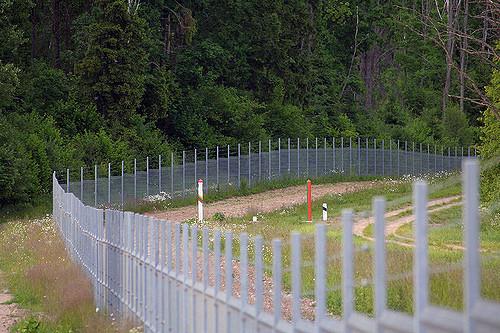 The Beat
The Beat
Let’s talk about drugs
The AFP announced last week that a Joint Organised Crime Task Force operation in Western Australia had resulted in charges being laid against 14 people and the seizure of approximately 200kg of methamphetamine. Further afield in Bangkok, the AFP and the Royal Thai police have launched a new joint taskforce on drugs.
This week, The Australian explored the battle between crime families in Sydney (paywalled) for control over the local drug trade. The article looks at recent murders, including that of Walid Ahmad—a leader of one of the major crime gangs—in broad daylight in a Bankstown café. On a related note, a new article on Motherboard has delved into how the ride-sharing app Uber is changing drug deals. The piece examines how Uber is being used in drug deals and the implications for Uber drivers and the law.
Tackling corruption: some options
At the Hay Festival in Wales, anti-mafia journalist Roberto Saviano has called the UK the most corrupt nation in the world. Saviano cited the financial services industry based in London as the heart of criminal capitalism that has laundered money through offshore networks. How can governments work to fight corruption? Nicholas Shaxson, writing for The Washington Post, has argued that ending corruption starts with cracking down on tax havens. For some alternatives, The Guardian suggests nine ways governments can use technology to reduce corruption.
CT Scan
West Australian man dies fighting with Kurdish
West Australian man Jamie Bright is reported to have been killed in northern Raqqa fighting with Kurdish forces against Daesh according to Kurdish social media accounts on 30 May. The 45 year-old joined the Kurdish People’s Protection Unit in January 2014. Bright, of no Kurdish heritage, claimed to have a military and engineering background, although records couldn’t be confirmed by the ADF. Bright is one of three Australians known to have fought alongside Kurdish forces including Reece Harding and Ashley Kent who both died last year. ASIO estimates at least 45 Australians have died fighting in Syria since 2011.
Terror suspect data deleted in UK
An administrative error has led to the biometric data profiles of up to 810 terror suspects being deleted by UK Police and security services. A revised report (PDF), released 28 May by Biometrics Commissioner Alastair McGregor, revealed 810 not 450 fingerprint and DNA records were deleted after officers failed to meet deadlines for National Security Determinations to be made that would allow authorities to store the data for extended periods. The National Police Chief’s Council says it’s reviewing the error.
Checkpoint
Should I stay or should I go now?
In the US there are two ways of becoming an illegal immigrant: entering without inspection (EWI) illegally or entering legally and then losing legal status, often through overstaying a temporary visa. Previously the majority of new illegal US immigrants were EWI, a recently published study at the Centre for Migration Studies has shown that there’s been a drastic increase in the number of US overstay illegal immigrants, with those exceeding their visa constituting 58% of new immigrations in 2012. According Alex Nowrasteh of the Cato Institute the increased contribution in the overstay rate isn’t the result of diminished security at entry and exit points. Instead it appears that relatively secure borders have caused a significant decrease in EWIs. That’s in contrast to a US Senate subcommittee hearing on immigration last week, where witness testimony stated that EWIs on the US’ southwestern border and an increase in the number of overstays is indicative of an insecure US immigration system.
Problems at the British Channel for Border Security
Immigration is a point of contention in the looming Brexit referendum on 23 June. To get a handle on the real numbers of those entering the UK, the House of Commons Library published a briefing paper on Migrations Statistics and Asylum Statistics last week. However, the topic has garnered significant attention over the weekend when 18 Albanians had to be rescued from the English Channel. The UK government responded by announcing plans to spend money on more patrol boats and surveillance capabilities to prevent migrants crossing the Channel. The investment will help bolster the maritime capabilities of the UK border force, which currently consists of just three vessels. The new investment will see the establishment of three maritime coordination hubs to improve the use of intelligence and generate flexible response units.
First Responder
Homebuyers left in the dark on climate change risk
The Climate Institute released a new report (PDF) on Monday, detailing the unrecognised and under-explained risk Australians face when building or buying property along the country’s coasts and in bushfire zones. There goes the neighbourhood examined the climate change risks to Australian housing and the overall finance sector, and called on governments, insurers and major banks to provide investors with clearer information relating to current and future risk levels. The report paid particular attention to Australia’s coastal regions, warning that the potential damage from coastal erosion may exceed $88 billion. Last month, the Coastal Risk Australia website was launched—a tool that utilises Google Maps, detailed tide and elevation data and future sea-level rise projections—to allow Australians to see whether their houses are at risk of inundation.
Global initiative reaches its target
The Rockefeller Foundation’s 100 Resilient Cities program reached its full quota last week, with 37 cities joining the global initiative to build resilience. Among the latest intake were rapidly-growing megacities such as Jakarta, Lagos, Seoul and Nairobi, as well as a number of cities in North America and across Europe. The first steps for those cities is to identify and appoint a chief resilience officer and create a resilience strategy that details how the city plans to develop an integrated, coherent response to sudden events and long-term urban pressures.